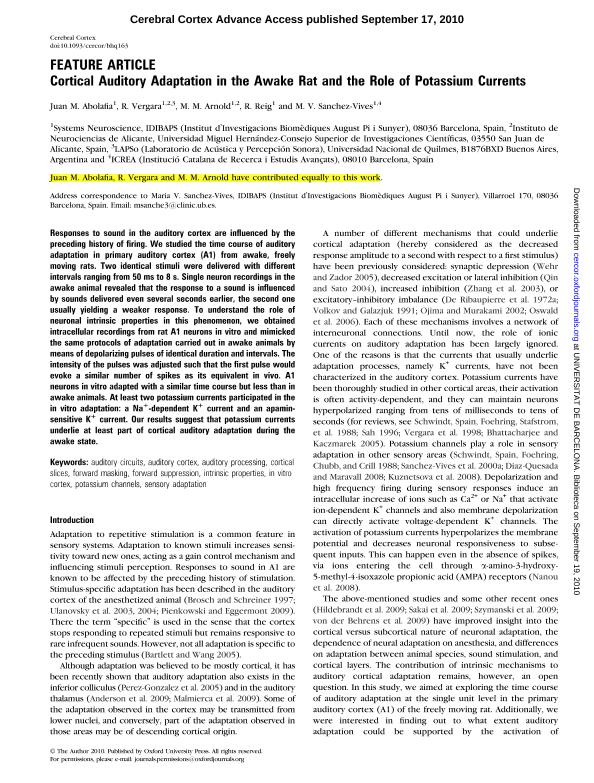Artículo
Cortical Auditory Adaptation in the Awake Rat and the Role of Potassium Currents
Fecha de publicación:
09/2011
Editorial:
Oxford Univ Press Inc
Revista:
Cerebral Cortex
ISSN:
1047-3211
Idioma:
Inglés
Tipo de recurso:
Artículo publicado
Clasificación temática:
Resumen
Responses to sound in the auditory cortex are influenced by the preceding history of firing. We studied the time course of auditory adaptation in primary auditory cortex (A1) from awake, freely moving rats. Two identical stimuli were delivered with different intervals ranging from 50 ms to 8 s. Single neuron recordings in the awake animal revealed that the response to a sound is influenced by sounds delivered even several seconds earlier, the second one usually yielding a weaker response. To understand the role of neuronal intrinsic properties in this phenomenon, we obtained intracellular recordings from rat A1 neurons in vitro and mimicked the same protocols of adaptation carried out in awake animals by means of depolarizing pulses of identical duration and intervals. The intensity of the pulses was adjusted such that the first pulse would evoke a similar number of spikes as its equivalent in vivo. A1 neurons in vitro adapted with a similar time course but less than in awake animals. At least two potassium currents participated in the in vitro adaptation: a Na +-dependent K + current and an apamin-sensitive K + current. Our results suggest that potassium currents underlie at least part of cortical auditory adaptation during the awake state.
Archivos asociados
Licencia
Identificadores
Colecciones
Articulos(SEDE CENTRAL)
Articulos de SEDE CENTRAL
Articulos de SEDE CENTRAL
Citación
Abolafia, Juan M.; Vergara, Ramiro Oscar; Arnold, M. M.; Reig, R.; Sanchez Vives, M. V.; Cortical Auditory Adaptation in the Awake Rat and the Role of Potassium Currents; Oxford Univ Press Inc; Cerebral Cortex; 21; 5; 9-2011; 977-990
Compartir
Altmétricas




